

Austin
Lee was a restless soul - a socialist and pacifist who fitted uneasily
into the Church of England, but was by all accounts a stirring preacher
who aroused affection, even though he was as rude about his
congregations as he was about bishops and other senior clergy! The
press dubbed him a cleric with a broom.
Son of a notable incumbent of the family living in
Claxby, Lincolnshire (though Austin was actually born in Keighley), he read English at Trinity College
Cambridge and then trained for ordination, first at Wells Theological College
and then at Ripon Hall, Oxford (more liberal - perhaps he fell out with
them at Wells?) He lasted a year as curate of Kew in 1928, courting controversy
with articles for the Sunday and popular papers as well as doing some
serious reviewing - his name is among the acknowledgements in Frederick
Brittain's Arthur Quiller Couch: a biographical study of Q
(CUP 1947). His equally brief spell at Christ Church Watney Street
(1930-31) followed, and only during this time was he priested. He was no doubt on Fr Groser's wavelength but
an uneasy colleague. Despite his views, for the next two years he became a
naval chaplain, serving with HMS Pembroke, HMS Royal Oak, the Mediterranean destroyer fleet, and HMS Cumberland (sailing to China), denying allegations of communism. In 1932 he wrote in the Daily Mail
| In the Middle Ages the church seemed to have touched the lowest depths of unspirituality. It seemed a spent force. But the Reformation came and brought new life and light to Europe. We are at the ebb of another tide. But can we say that the torch that blazed on Calvary has burned down and flickered out forever? ... There will be another revival in the church. Men touched with the old fire will go out again ... The man will come, and a new tide will sweep around the world, cleansing and renewing. |
There followed a period of other brief posts - vicar of Pampisford (1935-37), a chaplain at the Middlesex Hospital (1939-40), rector of Layer Marney (1941-44) - before he returned to the family
parish of Claxby with Normanby-le-Wold as Rector from 1944-48: this was a
relatively rich living, with a net income of £712 plus house (though he said publicly it was hard to live on
the stipend) and an appointment for which he did not need the
congregation's consent. His time there was lively. Unmarried, in 1945 he
moved out of the rectory into the gardener's cottage to give rent-free
accommodation to an ex-serviceman with six children: the Diocesan Board
forbade it, but in a press report he said It
is pure nonsense to have 22 rooms to one's self. But the board are
laity who believe that the village parson should be gentry, letting
people see that he is a cut above them by living in a big house. Pure
rubbish, I call it, so I have taken matters into my own hands. If the
Church will not let me do good, I will do it off my own bat.
His rural congregation was no doubt surprised by his special prayers
for the left-wing faction in the Greek civil war (ELAS) - and he
pressed the local Tory MP, Lt. Col. Sir Arthur Heneage, to oppose the government's
policy on Greece. He himself attempted to stand for Parliament in the 1945
election, for one of the Oxbridge seats (A.P. Herbert represented Oxford University from 1935 until their abolition in 1950) - despite the ban on Anglican clergy candidates. The Bishops sit in the House of Lords with impunity, he said (which was the historic basis of the clerical disqualification, removed in 2001). This is how it was reported in the Australian Women's Weekly of 7 July 1945:
| Rector of the little Lincolnshire parish of Claxby, Rev. Austin Lee, who is Independent candidate for Cambridge University, may, if he wins his seat, have to pay £500 per day in fines. According to my interpretation of the hundred-years-old law [the Clergy Disqualification Act, in fact of 1801] the fine becomes payable only if and when I actually take my seat in the Commons, he told me, so I'm not worrying till then. A tall, bearded bachelor of forty, Lee has had a varied career. During the Battle of Britain he served in the ranks of the R.A.F. He has been a naval chaplain and a newspaper reporter, and now looks after two parishes, covering the two miles between them on horseback. He leaves the horse in unorthodox fashion tethered to a haystack while he preaches his sermon. Friends at Cambridge University are in touch with the Clerk of the House of Commons trying to clear up the legal position, and protesting on the undemocratic bar on Anglican clergymen. |
He refused to pay his rates of £30 as a protest against
the neglect of rural areas; he didn’t expect water, sanitation or
street lighting (as a city dweller might) but objected that primary-age children had
to rely on powdered milk, while fresh milk from the tuberculin-tested herd in
Claxby went to the towns. He often officiated in wellies, ready for a
quick getaway on his motorbike to the Gordon Arms, and gave talks about
cookery.
When Clement Attlee became Prime Minister in 1945 Lee sent him an
'open letter', widely quoted in the press, about the appointment of the
next Bishop of Lincoln, including these words: Names
for this bishopric will be suggested to you. Among them will be men who
have given offence to nobody, men who are colourless in their
observances, inclining neither to the high or the low. Reject them all
... What are wanted for bishops are holy and humble men of heart who
would attract men and women to the church by the power of love.
In 1946 he announced that he was moving to a woodman's cottage in
Normanby Dales, lent by Lord Yarborough, which he shared with students
(renting out the Rectory). He continued to despair of the Church of
England, which was timid and lukewarm; its bishops were timid little men frightened of offending government,
and he surely did not endear himself to his parishioners by declaring
that in Claxby a parson was cut off from any real spiritual life. In 1947 he sought Monday to Friday work as a coal miner. He
also announced that he was off to South America, to work for a British
Seamen's organisation in Rosario. Neither of these happened; instead, in 1948
he moved back to London as Vicar of St Stephen Hounslow,
exchanging
livings with the Revd Launcelotte Bernard Zacchaeus Davies (a graduate
of Fitzwilliam Hall Cambridge, ordained in Wales in 1927). He warned
his congregation you may have had criticisms of me but just wait until you get the next man. This
proved to be true: within three months his successor was bound over at
the Old Bailey on six charges of marrying divorced people and falsely
entering them in the registers as 'widow or widower'; a consistory
court, acting under the 1892 Clergy Discipline Act,
then inhibited him from exercising his ministry for two years. (Lee
would no doubt have approved of his actions! The marriages were deemed
valid as the couples had acted in good faith.) Davies died in 1949 of
alcoholism, aged 47, living at a private hotel in Richmond, Surrey.
(For more details about
Claxby's history see this excellent and detailed study.)
At Hounslow the church had to be kept locked, whereas in Claxby and Normanby,
as he pointed out, the keys were either lost or had been melted down for
Waterloo cannons. During his three years at St Stephen's, he took up the cause of
Margaret Allen, a former bus conductress from Rawtenstall, sentenced to
hang for the murder of Nancy Ellen Chadwick (the first female death
sentence since 1936). In 1949 he sent a telegram to the King and Queen,
and to Clement Attlee, asking them to intervene to prevent the possible suicide or insanity of the men and women prison officers who will have to drag her to the scaffold. In press reports, he claimed he was less concerned about the accused's mental condition, but rather that there are warders in mental hospitals as a result of officiating at hangings. It was to no avail: Margaret Allen was executed at Strangeways.
He resigned his post - the Bishop dislikes me, he said, and the church is full of humbug and bootlicking - appointments only go to those who can be guaranteed to give no offence. A further period of wandering followed. In
1953, aged 49, he took to selling matches outside St Paul's Cathedral,
to draw attention to the plight of underpaid curates. Talk
of a shortage of clergy is humbug: the truth is that there's a shortage
of assistant clergy to run around and do the work for the incumbents
who draw the money. He then moved to Eire,
and was for a time a lay worker in the Roman Catholic church, living at
Letterfrack, County Galway. In 1954 he published an autobiography Round Many A Bend (Jonathan Cape 1954) [also titled Wild Goose Chase], written in a remote cabin and describing his varied experience as
naval chaplain, aircraftman, schoolmaster, barman, chef, writer of tour guides for Norwegian railways and editorial
assistant on the Daily Mail.
During this period he continued to earn his
living as a
writer, like other clergy who have served this parish but are
little-read today! He wrote screenplays and detective fiction, in
particular creating the
character of Miss Flora Hogg,
a red-haired middle-aged
French teacher who wore a dental plate, having lost her front teeth
playing field hockey, and smoked and drank. She was a graduate of
Bristol University (a careful choice: neither Oxbridge nor redbrick), who read herself to sleep with
Proust, and took up detective work
after the death of her police superintendent father. The plate on her
office read 'Miss Hogg B.A., Private Investigator'; her charges were
two guineas a day plus expenses; Milly Brown was her rather dim
sidekick. In the words of
one reviewer, frumpish in her purple
woollen three-piece, battered felt hat and heavy outsized brogues ...
not fearfully astute ... she did however get to her solution in the end.
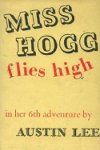
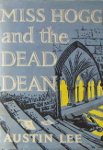
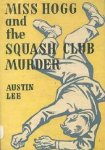
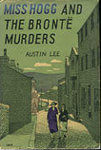
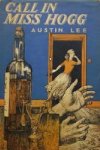
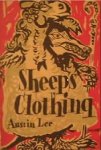 There were nine novels (with a number of recurring themes):
There were nine novels (with a number of recurring themes):
• Sheep's Clothing (1955) - a fake American bishop found dead in a family library: one review said she
sorts out this murder-mystery as though she were discovering who wrote
the rude word on the blackboard ... red herrings scrupulously fair ...
great fun
• Call in Miss Hogg (1956) - an orphaned actress and heiress was being pursued by an American private eye, who was then murdered;
Flora Hogg/Austin Lee typically notes that at 'The Cottage Loaf' the
soup was made out of one of those powders ... and the trifle tasted of
chemicals ... the peas were tinned, of course, but not processed
• Miss Hogg and the Brontë Murders (1956) - the murder of Ellis Gubbenheim, an American tourist on the Brontë trail, and the disappearance of a Brontë expert
• Miss Hogg and the Squash Club Murder
(1957) - Flora's former student Vanda Fitzgerald's jealous husband was a
suspect in the murder of Norman Potter, who played squash with
officials of the Atomic Research Station and may have been a spy; Flora
went under cover as a filing clerk at the Atomic Research Station
• Miss Hogg and the Dead Dean
(1958) - John Parker, former neighbour of Flora and a college chaplain,
was one of many suspected of the murder of Samuel Sheepshanks, Dean of
Warchester Cathedral (there had been several real-life clerical Sheepshanks)
• Miss Hogg Flies High
(1958) - schoolfriend Beryl Cunningham was social secretary to Lady
Anne, whose unfaithful husband Charles required her to host a secret
weapons conference at his country estate; in pique, she hired Flora to
monitor security, despite which Charles' secretary Tony Frant (heir to a peerage,
and a possible spy) was poisoned
• Miss Hogg and the Covent Garden Murders
(1960) - a London society hostess initially failed to report her
finding of the body of a naked woman, but a reporter had been present,
and Flora was hired by his editor; she identified the killer, but not
his motive
• Miss Hogg and the Missing Sisters
(1961) - Gertrude Hooley, her sister and the manuscript of her family
memoirs (over which she had consulted a neighbour about libel laws)
disappeared; Flora went to Ireland to trace the de Ferrers family, just
in time to stop the inter-marriage of descendants who had inherited both the land
and the family fortune
• Miss Hogg’s Last Case
(1963) - the rector of Ludby-in-the-Marsh (husband of one of Flora's
students) found the body of a Polish emigré who had consulted him
under the seal of the confessional - drug-dealing and blackmail ...
After this case, Flora decided she had had enough, and returned to teaching.
(All but Miss Hogg and the Dead Dean originally appeared pseudonymously, under the names of John Austwick or Julian Callender)
In a feminist critique, Kathleen Gregory Klein The Woman Detective: gender and genre (Univ of Illinois Press 1995) p 137 comments
| She fits the stereotype of an eccentric fiftyish English spinster ... She wears a pince-nez, smokes a cigarette after breakfast, goes to church on all the proper days, and doesn't approve of the Inland Revenue. She expects to be paid but has a distinctly haphazard attitude about retainers. She speaks of detecting as 'something like collecting stamps or taking up gros point' (Last Case 92); acknowledging that a detective ought not to be without a weapon, she suggests an umbrella. Without a car, she conducts her cases by walking or taking the bus, to the detriment of her investigations. Needing to follow a suspect, she commandeers two Cambridge undergraduates who are bored and have had a bit too much to drink; naturally, they treat the whole matter as a joke. But Miss Hogg is easily tripped up; once she even fails to negotiate a revolving door. It goes almost without saying that Flora Hogg always solves her cases by a combination of good luck, trances, forced confessions, and intuition which she attributes to psychological insight from her years of teaching. She readily admits that guns, bullet trajectories, footprints, and other material clues are beyond her scope. Her vivid imagination overcomes the deficiency. In Miss Hogg and the Dead Dean, she explains her methodology: 'My forbears had a very low opinion of episcopal clergymen, And, of course, I have a romantic temperament. I was brought up to think that all baronets were, ipso facto, wicked. Bold bad baronets figured in lots of the books my mother used to read, and which I read as a child. So Sir Andrew was my first suspect, naturally, and when I saw the archdeacon with him in the Mitre, I moved the archdeacon up into first place' (189). The police superintendent who is told that her intuition needs material to work on queries aptly, 'Like compost?' (Brontë 133). Results - upholding justice and capturing criminals - are certainly important to her; but she admits another pleasure: 'In this job ... you enjoy all the delights of not minding your own business with none of the feelings of guilt' (Call in Miss Hogg 65). This sort of frivolity pervades Austin Lee's novels; they achieve their humor through stereotyping and mysogynistic mockery. |
 As John Austwick, Austin Lee also produced six books featuring Detective Inspector 'Nosey' Parker: Highland Homicide (1957), The Hubberthwaite Horror (1958), Murder in the Borough Library (1959), The County Library Murders (1962), The Mobile Library Murders (1964) and The Borough Council Murders (1965). The predominance of the library setting no doubt reflects the fact that he did much of his writing in Keighley Reference Library (incidentally, the town of his birth). The
1959 instalment probes the murder in 'Airebridge' library of Joseph
Hackett, an elderly tramp, who is revealed to be a defrocked clergyman,
blackmailer, pornographer and drunkard. There are revealing
autobiographical comments, such as these remarks of a parson: a
clergyman is usually an educated man, and yet he may be placed in a
position where there is no one with whom he can carry on an
intellectual conversation, with whom he can discuss books, or the
happenings of the world around him. This may be all very well for a
married man, but it is wearying for a bachelor; and these of a parishioner, on the unpopularity of their incumbent: It's always the same, they never like the one they've got, it's always the one before or the one before that. As
with Miss Hogg, the plots and writing are politically incorrect, but
the books have a period charm (for instance, with barographs to measure
the weather, and a fire brigade using arc lamps), and some wry humour, such
as a painting of an elderly lady dressed in a manner that reminded DI
Parker of his grandmother, an
old matriarch who had played hell with the whole family until she had
been mercifully carried off in a minor influenza epidemic in the
thirties. Robert Bernard's foreword notes that, in the rural 1950s, public men acted within a framework of honesty and decency which they outraged at their peril, and he quotes George Eliot's Mill on the Floss: We
owe much to them for keeping up the sense of respectability, which was
the only religion possible to the mass of English people.
As John Austwick, Austin Lee also produced six books featuring Detective Inspector 'Nosey' Parker: Highland Homicide (1957), The Hubberthwaite Horror (1958), Murder in the Borough Library (1959), The County Library Murders (1962), The Mobile Library Murders (1964) and The Borough Council Murders (1965). The predominance of the library setting no doubt reflects the fact that he did much of his writing in Keighley Reference Library (incidentally, the town of his birth). The
1959 instalment probes the murder in 'Airebridge' library of Joseph
Hackett, an elderly tramp, who is revealed to be a defrocked clergyman,
blackmailer, pornographer and drunkard. There are revealing
autobiographical comments, such as these remarks of a parson: a
clergyman is usually an educated man, and yet he may be placed in a
position where there is no one with whom he can carry on an
intellectual conversation, with whom he can discuss books, or the
happenings of the world around him. This may be all very well for a
married man, but it is wearying for a bachelor; and these of a parishioner, on the unpopularity of their incumbent: It's always the same, they never like the one they've got, it's always the one before or the one before that. As
with Miss Hogg, the plots and writing are politically incorrect, but
the books have a period charm (for instance, with barographs to measure
the weather, and a fire brigade using arc lamps), and some wry humour, such
as a painting of an elderly lady dressed in a manner that reminded DI
Parker of his grandmother, an
old matriarch who had played hell with the whole family until she had
been mercifully carried off in a minor influenza epidemic in the
thirties. Robert Bernard's foreword notes that, in the rural 1950s, public men acted within a framework of honesty and decency which they outraged at their peril, and he quotes George Eliot's Mill on the Floss: We
owe much to them for keeping up the sense of respectability, which was
the only religion possible to the mass of English people.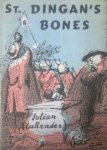 Austin Lee was a member of the National Crime Writers Association, and in 1959 appeared on the BBC Tonight programme to discuss Miss Hogg.
Austin Lee was a member of the National Crime Writers Association, and in 1959 appeared on the BBC Tonight programme to discuss Miss Hogg.| ELECTRICITY CHARGES Sir - Is not one of the great drawbacks of the national industries that they are so inflexible and impersonal? Local representatives cannot accept responsibility or make decisions, and must work by rule of thumb. I recently came as priest-in-charge of Sedgebrook with East and West Allington (where George Crabbe was once rector). I am occupying only 2 rooms in what, even by Victorian standards, was a very large rectory. (At one time it accomodated the boarders of the now defunct Sedgebrook Grammar School). The East Midland Electricty Board informs me that it does not matter how many rooms I occupy. I am to be charged on the floor space of the rectory. My sister, who has a small house in Fulbeck under the same authority, with 5 rooms and a great variety of electrical apparatus is paying less a year than I must pay a quarter for my 2 rooms. This seems unjust. Yours Faithfully, Austin Lee Sedgebrook Rectory, Grantham, Lincolnshire. |
His writing continued, and on 11 June 1958 he placed this advertisement in The Times for a part-time secretary/collaborator:
| Writer wants a typist, male, short period [about 100,000
words], pleasant accomodation, salary, expenses. |
Continuing
to move from parish to parish, in 1961 he became Rector of Willoughby
with Sloothby. He continued to bemoan the fate of the clergy,
complaining that he didn't
have enough work to do, for which he was taken to task by one Colonel
Madge in Time and Tide Business World (1961) who asked tartly what was the population of his benefice - is it by any chance one of those with less than 1,000 souls?
- and what stipend and other sources of income he received. In 1963 he
became Curate-in-Charge of Mumby, and left Lincolnshire later than year
to become Vicar of Great and Little Paxton, Huntingdonshire.
In 1964 he produced a satirical leaflet in which he suggested that the shabby old fashioned parson
should be replaced by a musical prayer wheel. His dis-ease with the
church had not abated: he alleged that the average congregation
contains a galaxy of the meanest, most malicious, back-biting, narrow-minded and bigoted members of the community.
Yet he continued to be admired by some for his crusading zeal. He died
in
January the following year. His funeral service was held in the chapel
of Trinity College Cambridge, and his ashes were interred in the family
grave in Claxby
churchyard.
Back to Christ Church Watney Street Curates | Back to St John Beverley Groser